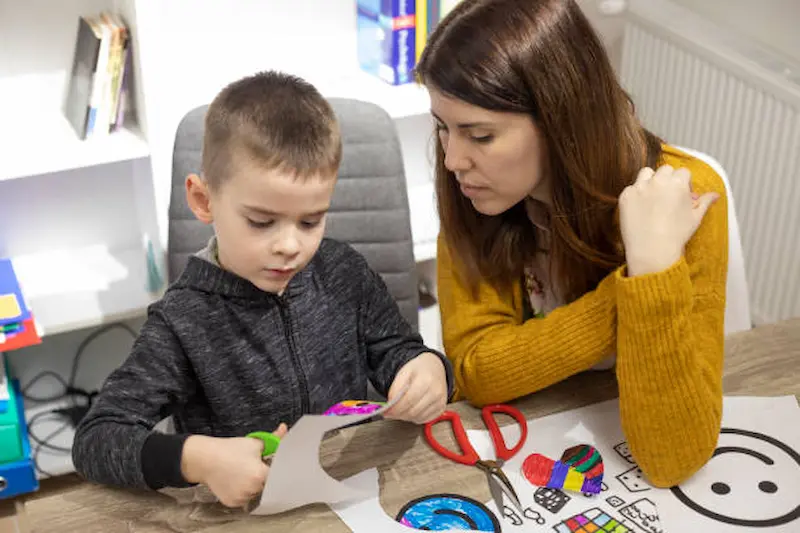Parenting Tips for Teenage Son” refers to practical and guidance-oriented advice provided to parents raising adolescent boys. These tips typically encompass strategies for effective communication, establishing boundaries, promoting independence, and navigating the unique challenges associated with the teenage years. Encourage independence while providing guidance, allowing your son to develop decision-making skills. Building a strong bond involves spending quality time, actively listening, and understanding his perspective, fostering a supportive foundation for emotional well-being and positive development.
In this blog, we explore crucial “Parenting Tips for Teenage Sons” aimed at assisting parents in navigating the challenges of adolescence. From fostering effective communication to promoting independence, these tips guide parents in building strong bonds with their teenage sons.
Table of contents
- Understanding Adolescence
- Setting Clear Boundaries
- Quality Time Together
- Building Trust
- Dealing with Conflict
- Nurturing Emotional Well-being
- Balancing Freedom and Responsibility
- Educating on Healthy Relationships:
- Navigating Peer Pressure
- Educational Support
- Addressing Substance Abuse:
- Mental Health Awareness
- Promoting Respect and Empathy
- Celebrating Achievements
- Conclusion
- Frequently Asked Questions ( FAQs )
Understanding Adolescence

A. The Teenage Brain
- Neuroplasticity: Adolescents experience heightened brain plasticity, allowing for enhanced learning and skill acquisition.
- Prefrontal Cortex Development: The prefrontal cortex, responsible for decision-making and impulse control, undergoes significant maturation during adolescence.
B. Hormonal Changes
- Puberty: Hormonal fluctuations trigger physical changes like growth spurts and the development of secondary sexual characteristics.
- Emotional Impact: Hormones influence mood swings, affecting an adolescent’s emotional well-being.
C. Emotional Development
- Identity Formation: Adolescents explore and solidify their sense of self, shaping future aspirations and values.
- Emotional Regulation: Developing the ability to manage emotions becomes crucial for social interactions.
D. Peer Pressure
- Social Influence: Peers play a pivotal role in shaping behaviors and choices during adolescence.
- Risky Behaviors: Adolescents may succumb to peer pressure, making it essential to foster resilience and decision-making skills.
Setting Clear Boundaries

Establishing well-defined boundaries is essential for adolescent development. Clear guidelines provide a sense of structure and security, aiding teenagers in understanding expectations and consequences. It fosters responsible decision-making and helps navigate newfound independence. Parental consistency in enforcing boundaries establishes a framework for healthy relationships, promoting mutual respect between parents and teenagers.
These limits serve as a foundation for shaping positive behaviors, contributing to the overall well-being and development of adolescents during this critical phase of life. Embracing positive parenting practices is an integral aspect of this process. Positive parenting involves fostering a supportive and nurturing environment, emphasizing communication, empathy, and encouragement.
Quality Time Together
Quality time is pivotal for fostering strong familial bonds. Engaging in meaningful activities and open communication nurtures emotional connections among family members. Shared experiences, free from electronic distractions, create lasting memories and contribute to a sense of unity. Whether it’s participating in hobbies or simply enjoying each other’s company, dedicating time to building relationships fortifies the foundation of a supportive and loving family environment, promoting overall well-being and resilience in the face of life’s challenges. Additionally, this intentional family time plays a crucial role in skill development.
Building Trust

A. Trust-Based Parenting: Nurturing trust in parent-child relationships involves respecting boundaries, active listening, and fostering open communication. This foundation bolsters a child’s self-esteem and emotional well-being.
B. Empowering Independence: Encouraging autonomy instills a sense of responsibility and self-confidence in individuals. Allowing room for decision-making within safe parameters contributes to their personal growth and resilience.
C. Trustworthy Role Modeling: Adults who exemplify honesty and integrity become influential role models, reinforcing the importance of trustworthiness in interpersonal relationships.
D. Transparency and Honesty: Open communication, coupled with honesty, establishes a culture of trust. Providing information, even when difficult, fosters understanding and reinforces the value of integrity in building and sustaining meaningful connections.
Dealing with Conflict
Effectively managing conflict within a family requires open communication and empathy. Encouraging constructive dialogue and active listening fosters understanding. Teaching conflict resolution skills equips children with valuable tools for navigating disagreements.
By addressing conflicts proactively and modeling respectful communication, parents create a positive environment that emphasizes compromise, empathy, and resolution. This approach not only strengthens family bonds but also equips children with essential skills for managing conflicts in various aspects of their lives.
Nurturing Emotional Well-being

Prioritizing emotional well-being is integral to overall health. Creating a supportive environment that acknowledges and addresses emotions helps individuals develop resilience. Encouraging open communication and self-expression fosters emotional intelligence. Practices such as mindfulness and stress management contribute to a balanced mental state. By nurturing emotional well-being, individuals can navigate life’s challenges more effectively, build positive relationships, and maintain a stable foundation for their overall health and happiness. Additionally, instilling the principles of positive thinking for kids further enhances emotional well-being.
Balancing Freedom and Responsibility
Striking a delicate equilibrium between freedom and responsibility is vital for personal development. Providing individuals, especially adolescents, with autonomy cultivates self-reliance and decision-making skills. Simultaneously, instilling a sense of responsibility ensures accountability for one’s actions. This delicate balance fosters maturity and resilience, preparing individuals to navigate life’s complexities with confidence. The process empowers individuals to make informed choices, learn from experiences, and contribute positively to their communities, promoting career growth and societal well-being.
Educating on Healthy Relationships:

Promoting awareness and understanding of healthy relationships is crucial in fostering positive social dynamics. Education in this realm emphasizes effective communication, mutual respect, and emotional intelligence. It equips individuals with the tools to navigate friendships, romantic partnerships, and familial connections in a constructive manner. By instilling these values, society can work towards building a foundation of empathy and cooperation, leading to more fulfilling and harmonious relationships at personal and societal levels. Moreover, integrating a focus on academic achievement within this educational framework enhances the overall development of individuals.
Navigating Peer Pressure
Adolescents often grapple with peer pressure, making guidance crucial for healthy development. Educating teenagers on assertiveness and decision-making empowers them to resist negative influences. Encouraging open communication allows parents to understand their child’s social dynamics and offer support. Building resilience equips teenagers to make informed choices, fostering independence and self-confidence.
By addressing peer pressure proactively, parents play a pivotal role in shaping their child’s ability to navigate social challenges, promoting positive relationships and personal development.
Educational Support
- Individualized Learning: Tailoring education to students’ unique needs enhances comprehension and engagement.
- Technology Integration: Incorporating modern tools fosters interactive learning experiences and prepares students for a tech-driven world.
- Specialized Programs: Offering targeted interventions and enrichment programs caters to diverse learning styles.
- Teacher Professional Development: Continuous training equips educators with evolving teaching methods, ensuring a high-quality learning environment.
- Emotional Well-being: Addressing mental health concerns through counseling services promotes a conducive atmosphere for effective learning.
Addressing Substance Abuse:

A. Warning Signs: Recognizing behavioral changes, declining academic performance, or shifts in social circles are crucial indicators of potential substance abuse. Vigilance can prompt timely intervention.
B. Honest Conversations: Open and non-judgmental dialogues about substance abuse foster trust. Honest discussions enable parents to understand underlying issues and provide necessary support.
C. Seeking Professional Help: If concerns escalate, involving professionals such as counselors or addiction specialists ensures specialized guidance tailored to the child’s needs.
D. Prevention Strategies: Emphasizing education on the risks, promoting healthy coping mechanisms, and fostering a supportive environment proactively mitigate substance abuse risks, promoting overall well-being.
Mental Health Awareness
A. Recognizing Signs of Mental Health Issues: Education on identifying early signs of mental health concerns empowers individuals to seek timely support and intervention, fostering a proactive approach to well-being.
B. Reducing Stigma: Efforts to destigmatize mental health challenges promote open conversations, encouraging individuals to seek help without fear of judgment. This societal shift creates an inclusive environment that supports those facing mental health issues.
C. Promoting Self-Care: Emphasizing self-care practices underscores the importance of maintaining mental health through activities like exercise, mindfulness, and adequate rest.
D. Supporting Therapy and Counseling: Encouraging access to professional mental health services reinforces the value of seeking specialized support, ultimately contributing to improved mental health outcomes.
Promoting Respect and Empathy
Fostering a culture of respect and empathy is foundational for harmonious relationships and societal well-being. Encouraging individuals to understand diverse perspectives and appreciate differences enhances social cohesion. Teaching active listening and empathy cultivates compassionate communication, reducing conflicts and fostering a more inclusive environment. By instilling these values, individuals contribute to building a society where kindness, understanding, and mutual respect are central, promoting a positive and supportive community for everyone. Furthermore, instilling good manners for kids plays a crucial role in this process. Teaching children basic etiquette, such as saying “please” and “thank you,” practicing patience, and respecting others’ personal space, contributes to the development of courteous and considerate individuals.
Celebrating Achievements

Acknowledging and celebrating achievements is integral to a teenager’s self-esteem and motivation. Recognizing both small and significant milestones fosters a positive environment. Whether academic, personal, or extracurricular, celebrating accomplishments reinforces a sense of accomplishment and encourages continued effort. This positive reinforcement builds resilience and self-confidence, contributing to a teenager’s overall well-being and instilling a lifelong appreciation for personal growth and achievement. Additionally, incorporating fun activities for kids during these celebratory moments can further enhance the positive experience.
Conclusion
Parenting Tips for Teenage Son” refers to actionable advice for parents raising adolescent boys, addressing challenges such as communication, independence, and emotional well-being.Cultivating open communication, setting clear boundaries, and spending quality time contribute to fostering resilience and emotional well-being in teenage boys. Strong parent-child connections established during adolescence often lead to improved trust, reduced behavioral issues, and a foundation for healthy relationships as they transition into adulthood.
Elevate your child’s learning journey with BrightChamps, the leading EdTech company offering a transformative blend of robotics, financial education, and coding courses.
To get your hands on more such articles, educational content, and free resources on coding for kids, robotics courses, game development, etc., check out the BrightCHAMPS Blog Page now!
Frequently Asked Questions ( FAQs )
A1. Common challenges in parenting teenage sons include communication barriers, independence struggles, and navigating emotional changes.
Q2. How can I maintain a strong bond with my teenage son?
A2. Maintaining a strong bond with your teenage son involves active listening, respecting boundaries, and engaging in shared activities to foster connection.
Q3. What should I do if my son is facing peer pressure?
A3. If your son faces peer pressure, offer open communication, provide guidance on decision-making, and encourage positive friendships.
Q4. How can I support my son’s mental health?
A4. Supporting your son’s mental health includes promoting open dialogue, seeking professional help if needed, and fostering a supportive environment.
Q5. How do I address substance abuse issues?
A5. Address substance abuse by initiating an honest conversation, seeking professional assistance, and establishing clear boundaries with consequences.


 We are an army of educators and passionate learners from BrightChamps family, committed to providing free learning resources to kids, parents & students.
We are an army of educators and passionate learners from BrightChamps family, committed to providing free learning resources to kids, parents & students.













